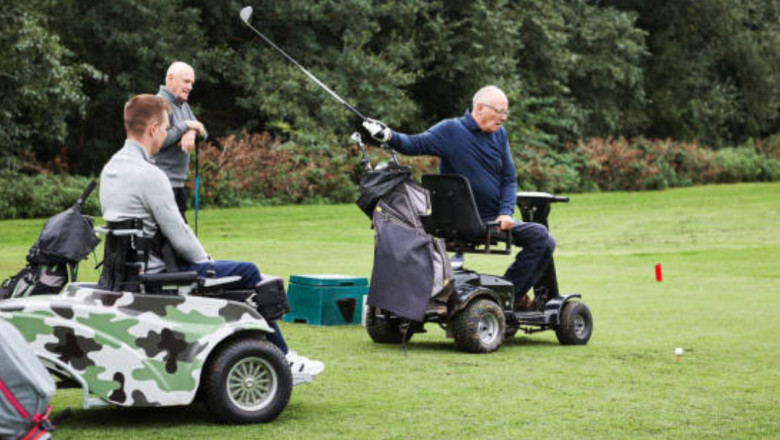views
Mobility limitations can severely impact quality of life, restricting freedom, independence, and the ability to engage in everyday activities. As our society strives to become more inclusive and accessible, creative mobility solutions are gaining popularity. Among these, golf carts are emerging as a surprisingly powerful tool for supporting individuals with mobility challenges. Originally designed for fairway travel, modern golf carts have evolved into versatile mobility vehicles that provide safety, comfort, and flexibility across a variety of environments.
Whether it’s navigating large properties, getting around retirement communities, or providing reliable transport within resorts or campuses, golf carts have made it easier for mobility-impaired individuals to stay connected with the world around them. Thanks to customization options, enhanced battery systems, and ADA-compliant features, they’ve become much more than a luxury — they’re a lifeline for many.
The Evolution of Golf Carts into Mobility Aids
Once limited to country clubs and golf courses, golf carts have undergone a significant transformation in recent years. Today’s models are equipped with ergonomic seating, weatherproof enclosures, adaptive controls, and electric drivetrains. These improvements have turned them into legitimate alternatives to traditional mobility scooters and small personal vehicles, particularly for those who don’t require a wheelchair but still face walking challenges.
For seniors, veterans, or individuals with conditions such as arthritis, muscular dystrophy, or neurological impairments, the option to move around independently can be empowering. Golf carts fill the gap between walking and needing a fully motorized wheelchair, providing just enough assistance without sacrificing autonomy.
Accessibility Customizations Enhance Comfort and Safety
A significant reason golf carts are gaining popularity among mobility-impaired individuals is their adaptability. Customizations like hand controls, ramps, swivel seats, and extended roof covers are now readily available. These adjustments allow users to comfortably operate or ride in the cart without physical strain.
Moreover, the rise of street-legal golf carts means individuals can use them beyond private properties. In golf cart-friendly communities, they are commonly seen at grocery stores, parks, and even local businesses. They not only promote greater participation in community life but also reduce dependence on caregivers or expensive medical transport services.
Battery Reliability Is Crucial for Independence
One of the key aspects of using golf carts as mobility aids is battery performance. Unlike recreational users, mobility-impaired individuals rely on their carts for daily routines. This makes long-lasting, dependable batteries essential for safety and convenience. For example, premium battery brands like Trojan are widely recognized for their durability and longevity.
If you’re searching for power solutions that offer consistent performance and minimal maintenance, you might want to explore Trojan batteries near Delaware. Choosing a quality battery ensures your golf cart operates reliably, especially for those who can’t afford unexpected breakdowns or delays. These high-performance batteries can support extended travel ranges, quicker charging times, and improved efficiency — all critical when the cart functions as a primary mobility tool.
How Communities Are Adopting Golf Cart-Friendly Infrastructure
With the growing use of golf carts among mobility-impaired individuals, many towns and developments have started updating infrastructure to accommodate these vehicles. Paved paths, designated parking areas, and lower speed zones help make golf carts a safe and practical choice for everyone.
In particular, retirement communities and assisted living facilities are leading the charge. They design layouts with wide roads, accessible sidewalks, and charging stations, making it easy for residents to use golf carts as their main mode of transport. This forward-thinking approach not only improves mobility but also fosters a more inclusive, socially engaging environment.
Economic and Environmental Benefits
Beyond accessibility, golf carts offer economic and environmental advantages. For individuals on fixed incomes or with medical expenses, the lower cost of owning and operating a golf cart compared to a car can be a major benefit. Golf carts have fewer maintenance requirements, lower fuel (or electricity) costs, and typically don’t require insurance or registration fees in private communities.
Environmentally, electric golf carts produce zero emissions, which makes them a green alternative for short-distance travel. By switching to electric-powered mobility carts, communities also contribute to reduced noise pollution and carbon footprints, all while supporting those in need of convenient transportation.
Empowering Independent Living Through Personal Transportation
The sense of independence that comes from being able to move freely is irreplaceable. Golf carts help mobility-impaired individuals regain control over their daily lives — whether that means picking up groceries, visiting neighbors, or simply enjoying a sunny day outdoors.
For caregivers and family members, this also brings peace of mind. Knowing their loved one has a reliable and safe means of transportation can reduce stress and enhance overall well-being. In many cases, it eliminates the need for constant assistance, allowing both parties more personal freedom.
The Future of Golf Carts in Mobility Support
As technology advances, the capabilities of golf carts continue to expand. Manufacturers are now integrating smart features like GPS navigation, real-time battery monitoring, backup cameras, and even collision sensors. These enhancements not only increase usability but also provide extra layers of safety for users who may have additional health concerns.
Additionally, as awareness grows, more insurance providers and public institutions are recognizing golf carts as legitimate mobility aids, potentially opening doors to subsidies or health-based financing options. Advocacy from disability organizations is pushing for greater accessibility standards, which will further support the integration of golf carts into mainstream mobility solutions.
Final Thoughts
In today’s mobility-focused world, golf carts have emerged as practical, empowering solutions for individuals facing physical challenges. They provide an affordable, adaptable, and environmentally friendly means of getting around — one that aligns with a lifestyle of independence and dignity.
As infrastructure adapts and technology evolves, the role of golf carts in improving accessibility will only grow. For anyone seeking an alternative to traditional mobility devices, golf carts offer a perfect blend of function and freedom — helping thousands of people navigate life with greater ease, comfort, and confidence.














Comments
0 comment